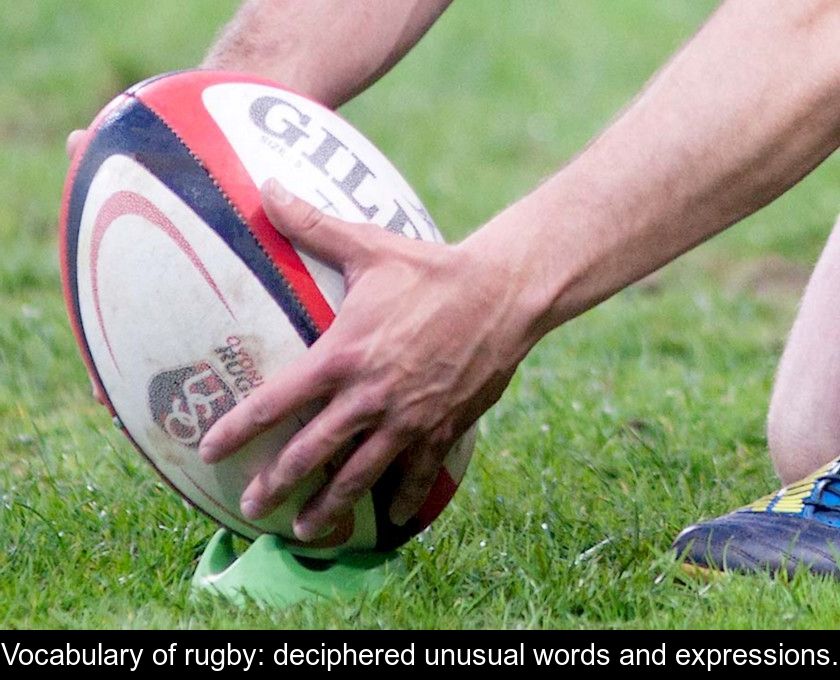Vocabulary Of Rugby: Deciphered Unusual Words And Expressions.
Just hours away from the France - New Zealand match that will open the 10th edition of the Rugby World Cup, you are probably getting ready to follow this competition on television. But are you sure you are prepared and know everything about the unique vocabulary of this sport? We invite you to revise or discover the vocabulary of rugby through its most unusual words and expressions.
A medley of flowery expressions.
It may seem hard to believe when you see the roughness of some actions on the field, and yet rugby has its own poetry! The vocabulary of rugby is full of flowery expressions that are not always easy to understand for newcomers.
That's why I propose a little anthology that should help you decipher the words used by commentators during the broadcast of matches on TF1, France Télévisions, and M6.
An abundance of images
In rugby vocabulary, there are plenty of images to describe a beautiful sequence of play. It is said that the players make the ball sing or the pigskin when they pass the ball fluently to go towards the opposing try line.
If the commentator says that a player has kicked a high ball that lights up the game, don't look for fire or flames! Kicking a high ball consists of sending the ball into the air with a powerful kick to break the deadlock against a well-organized defense. And if a teammate manages to catch the ball behind the defenders, it is said that this action has successfully "lit up the game".
The pig is in the corn means that the match is turning in favor of one team. This expression popularized by journalist Pierre Salviac is also used when a player from the opposing team causes chaos and gets dangerously close to the goal line.
In an even more martial register, it is said that the players bring out the spiked helmets when they show intense or brutal physical commitment on the field. This expression of course refers to the helmets used by the Prussian and then German armies until World War I.
Humor in case of clumsiness
If the ball "sings" when there is beautiful play on the field, it can turn into a brick or even a sausage when the players show clumsiness...
It is said that a player "throws a brick" or "sends a sausage" when they make a poorly adjusted pass that puts their teammate in difficulty.
During a lineout, the thrower must be precise so that the jumper can catch the ball. When the throw is missed, it is said that the player "throws like a pizza maker", referring to the Italian chef who randomly tosses the dough between his hands.
The vocabulary of rugby is clearly inspired by that of cooking... If you hear that a player is "in the fridge", don't worry about the risk of hypothermia! This expression simply means that they have been cautioned with a yellow card and must stay on the bench for 10 minutes. In case of a card (yellow or red), it is also said that the player has received "a biscuit".
Terms that are confusing.
In the vocabulary of rugby, some words can be confusing. For example, if the word "caramel" evokes the sweetness of a treat for you, know that on the field it refers to a violent tackle. It is also referred to as a "tampon" or a "bouchon".
During the Rugby World Cup 2023 matches, you may hear about a "chistera"... This word may surprise you as it is an accessory used by players of Basque pelota! In the world of rugby, making a chistera consists of passing the ball behind your back with the opposite arm (for example: sending the ball to the right with your left arm). It is the curved movement of the arm that resembles the chistera used in Basque pelota.
When a commentator talks about an ugly "cravate", he is not referring to the fashion style of rugby players but to a foul move (considered dangerous play). Making a cravate means reaching out with your arm to hit another player in the throat... and that is really naughty.
If you hear the expression "cadrage débord" or "cad deb", know that it is an abbreviation for "cadrage débordement". This action consists of an attacker charging towards an opponent before feinting by suddenly changing direction. The goal of this maneuver is, of course, to outflank the opponent by surprising them with a sudden sidestep.
Finally, at the end of a match, you may hear someone say "le chat est maigre". In this case, even if your favorite team has won, it is only by a very small margin. The score is low and there is no reason to boast...










